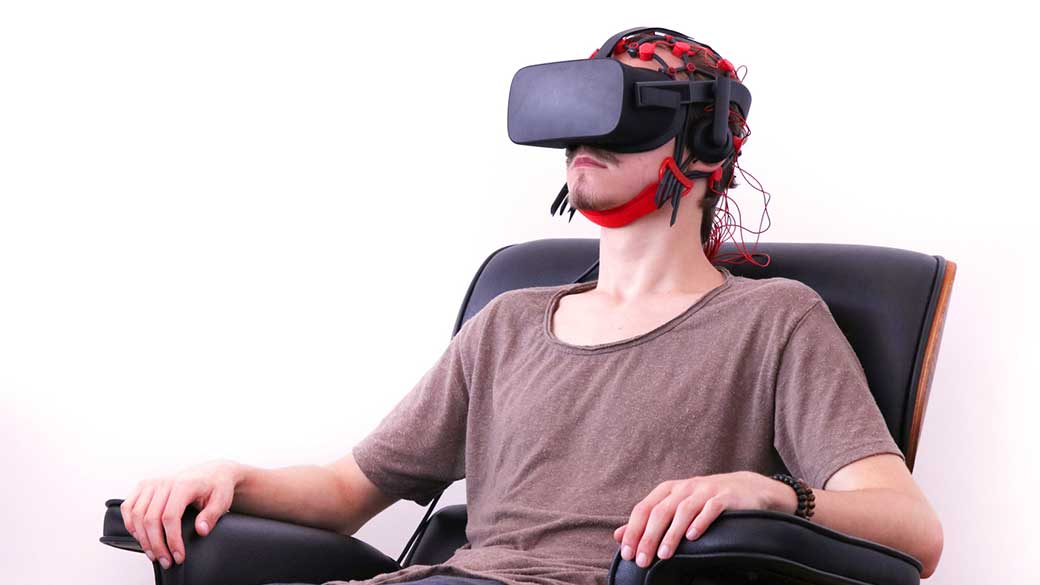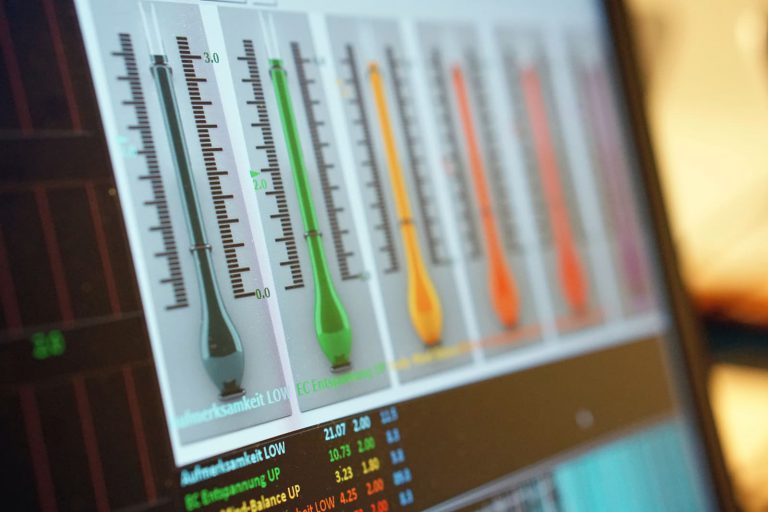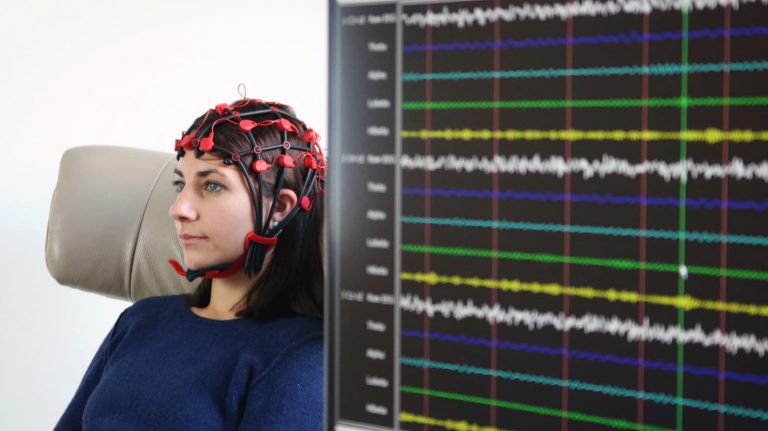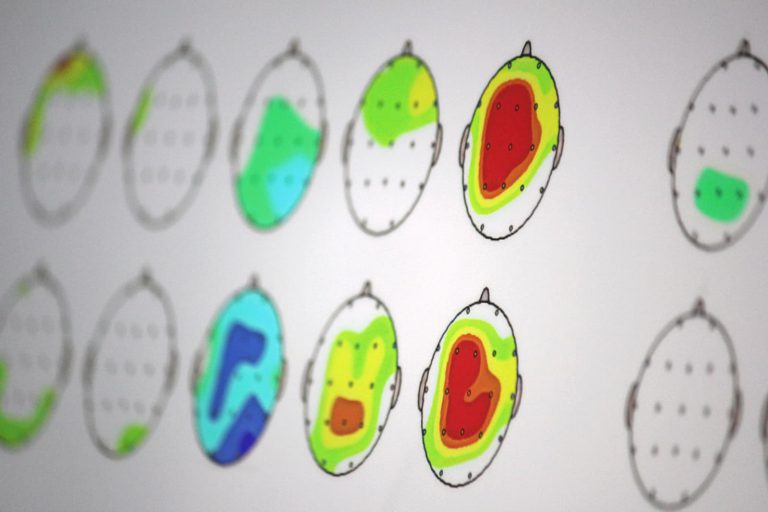
Brainwave Music for medical VR
As you probably know, I like to work with sound in VR. But there is more than that, I pretty much got my life and can’t stop thinking about spatial audio everyday.
But this time I wanted to take it one step further. I teamed up with a Munich company called Brainboost, who are specialized in neurofeedback. This means that we are measuring the electric activities (EEG, Electroencephalography) of the brain and using the data in real-time to create an experience for stress relief. By monitoring the activity of the brain at different frequency levels, we can provide real-time feedback and adapt the music to optimize therapeutic results. Electrodes and sensors are attached to the bodies of participants to collect data for the neurofeedback process, allowing us to study how different frequencies influence brain states and overall well-being.
VR works great because you avoid any distractions from the outside and can really focus on the session. But with sound design and music, you can even influence the emotions of the patient. If you do it right, it helps to get immersive but also calming at the same time. This is what triggers theta brainwaves and reduces beta waves. Like this, you can learn what your brain needs to do in order to reprogram itself to avoid stress in a longterm way. Individual pieces or tracks are composed to target specific brainwave frequencies for different therapeutic outcomes, such as concentration, relaxation, or sleeping.
The creative and technical challenge as an immersive audio producer is to have music that:
-
is not too boring for longer sessions, but also not too exciting to avoid higher heart rates
-
is not too many loops are used to be repetitive, but also not too distracting so that the patient knows what elements to listen to
-
create a progression that ends into an uplifting feeling to give the patient a feeling of achievement
Each track is engineered based on scientific study and the results of neurofeedback experiments, ensuring that the music is tailored for optimal brainwave entrainment and therapeutic effect.
The possibilities that biofeedback and brainwave data open up for creating new ways of working with immersive audio in VR are vast, allowing for innovative and personalized experiences.
Experts such as Dr. Thompson and Dr. Oster have contributed to the development and study of brainwave music, providing a strong scientific foundation for this approach.
This project is under development and stretching the boundaries using sound in combination with brainwave. As the project evolves, there will be the addition of new content and unreleased recordings to the collection. Users will also be able to download high-quality tracks for personal use, making it easy to access and enjoy the benefits of brainwave music.
The effects of the music go beyond relaxation—there is significant healing potential for both mental and physical well-being. During a VR session, the music can help with concentration, and users often report feeling more relaxed or energized after a session. The process of finding the right brainwave state or sound for each individual is important, with many users hoping to achieve stress relief or mental clarity. There is real joy and satisfaction when users find the right track or piece that helps them relax or focus.
Despite the proven results, there is a lack of mainstream awareness about the benefits of brainwave music, and this project aims to address that. Brainwave music can help clear and relax minds, sort out thoughts, and prepare for sleeping, making it especially helpful for tired individuals, such as those recovering from travel or stress. There are many ways to use brainwave music, from meditation to working or simply relaxing.
The project also draws inspiration from pioneering records in the field of electronic and brainwave music, building on a rich history of innovation in this area.



Sleep Improvement Techniques
Sleep is one of the most vital aspects of our physical and mental well-being, yet so many people around the world struggle with getting enough quality rest. Fortunately, research has shown that music—especially harmonic sounds designed to relax the mind and body—can play a powerful role in improving sleep. Scientists and artists have collaborated to create collections of calming music that help reduce stress and anxiety, making it easier to drift off and stay asleep through the night.
The science behind this is fascinating: our brainwaves shift as we move from wakefulness to sleep, and certain frequencies, like those found in alpha and theta waves, are closely linked to deeper relaxation and better sleep quality. By listening to music or sounds that are based on these frequencies, you can help guide your brain into a more restful state. Meditation and relaxation techniques, when paired with soothing music, can further enhance this effect, helping to quiet racing thoughts and prepare your body for bed.
To get the most out of music for sleep, it’s helpful to create a bedtime routine that signals to your mind and body that it’s time to wind down. This might include playing a carefully curated collection of sleep-focused tracks, reading a book, or practicing gentle stretches. Many people find that downloading or streaming a dedicated sleep music collection gives them easy access to high-quality, research-based sounds that help them relax and let go of the day’s stress.
The benefits of incorporating music into your nightly routine go beyond just falling asleep faster. Studies have shown that people who listen to calming music before bed experience better sleep quality, reduced feelings of anxiety, and even improved creativity and focus during the day. By taking control of your sleep environment and experimenting with different sounds and techniques, you can find the kind of music that works best for you—helping you wake up feeling refreshed, energized, and ready to take on whatever the day brings.
If you’re interested in learning more about how music can help improve your sleep, there’s a wealth of information available from scientists, artists, and sleep experts. Check out reputable sources, read up on the latest research, and don’t be afraid to try out different approaches until you find the perfect fit for your needs. In the end, making music a part of your sleep routine is a great way to enhance your overall quality of life, boost your creativity, and ensure your mind and body get the rest they deserve.